|
| |
This week in: Peace & Security Publications |
IPSI | Africa | Americas | East Asia | Europe & Central Asia | Middle East | South Asia
|
|
|
|
| |
This week in Peace & Security Publications
|
|
|
|
| |
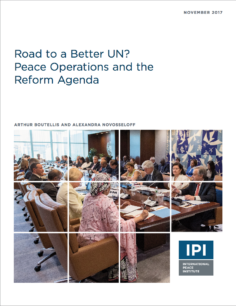
IPI: This report asks whether the reform agenda put forward by Guterres would—or would not— indeed help realize the four strategic shifts called for by HIPPO and under what circumstances, providing preliminary analysis of the five parallel streams…
|
|
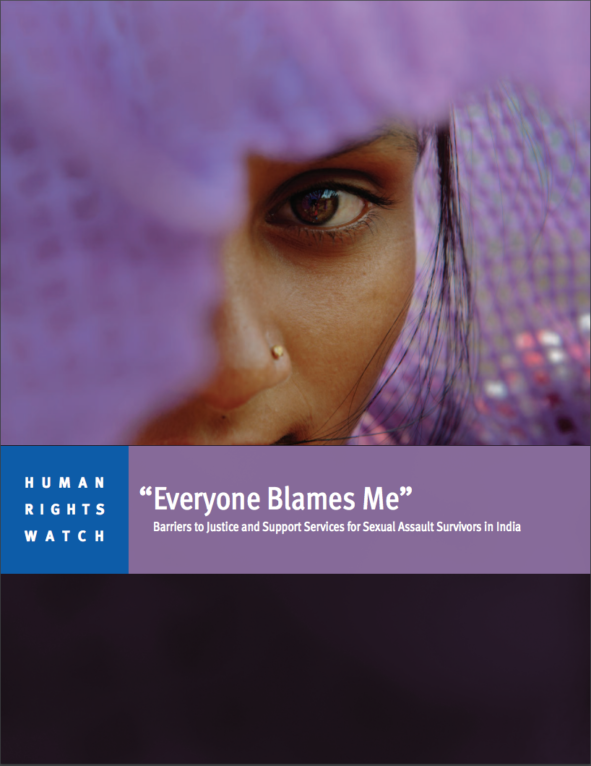
HRW: Human Rights Watch research shows persistent gaps in enforcing the laws, relevant policies, and guidelines aimed at justice for victims of sexual violence. This report details the scope of the problem drawing on in-depth research into 21 cases—10 involving girls under the age of 18…
|
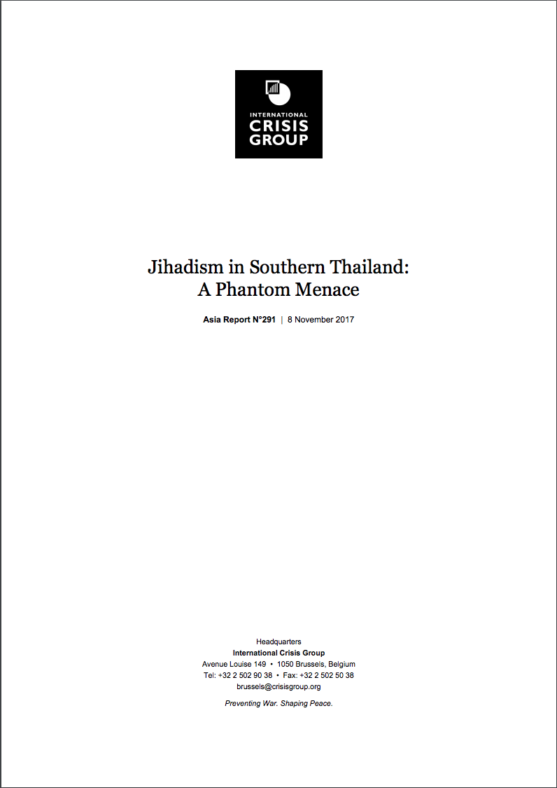
CSIS: Such patterns of involvement with ISIS or other jihadist groups to date have not manifested themselves in southernmost Thailand. One reason is that Thailand’s Malay-Muslim society is not a sympathetic milieu…
|
|
|
|
|
|
| |
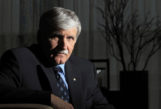
Bologna Faculty Member Lieutenant-General Romeo Dallaire be a featured guest speaker at the Southwest Agricultural Conference in Ridgetown, Ontario, Canada in January 2018.
|
|
|
|
|
|
| |
This week in Sub-Saharan Africa
|
|
|
|
| |
DRC: Uncertainty as election date sets to replace Kabila due to external pressure
On Sunday, after delaying a presidential vote due to violence, the Independent National Electoral Commission (CENI) set a date for the election on December, 23, 2018. Elections were meant to take place in November 2016, but officials said the vote was postponed because of deadly violence in the Kasai region and logistical hurdles. The announcement came little more than a week after U.S. Ambassador to the United Nations Nikki Haley’s visit to DRC, who before meeting Kabila said elections should take place by the end of 2018. Rights groups and opposition politicians have issued concern as president Kabila looks set to remain leader for another 14 months, having held power for the past 16 years. U.S. State Department spokesmen Heather Nauert said setting the date marks “a significant step toward realizing the country’s first peaceful, democratic transfer of power,” and called on Kabila to respect the constitution, withdraw from the election, and not seek a third term. Comment: The country has seen widespread anger over President Kabila’s refusal to relinquish power after his second full term ended in December 2016. He had taken power after his father was assassinated in 2001, and was elected in 2006 and 2011. According to the constitution, Kabila cannot seek a third term. (Aljazeera, Daily Nation, News24)
|
|
|
|
|
| |
SOMALIA: Islamic State’s footprint spreading in northern parts
On Wednesday, the UN reported that a militant faction loyal to Islamic State (IS) has increased its following in northern Somalia in the last year from a few dozen to roughly 200 currently. This increase in strength of the IS spin-off group has attracted attention because some security officials fear it could offer a safe haven for Islamic State militants fleeing military defeat in Syria and Iraq. Somalia’s main Islamist insurgent group, al Shabaab, is aligned with al-Qaeda and is most active in the country’s south. It has repeatedly clashed with the Islamic State-aligned faction in the north, but it is feared that the two groups could join forces. Comment: Somalia has been riven by civil war and Islamist militancy since 1991 when clan warlords overthrew a dictator before turning on each other. ( Reuters, CNN, Newsweek)
|
|
|
|
|
| |
ZIMBABWE: Mugabe faces political threat as sacked deputy gathers support
| |
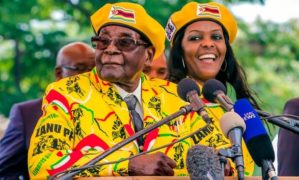
|
On Monday, President Mugabe fired his long-time ally Emmerson Mnangagwa for showing “traits of disloyalty,” abruptly removing a favorite to succeed the 93-year old leader and boosting the likelihood of Grace Mugabe, the first lady, becoming his next deputy and potential successor. A close ally said on Wednesday that Mnangagwa had fled “assassins” for “a safe place” and would arrive in neighboring South Africa later this week. Robert Mugabe is facing his biggest political challenge in almost two decades as opposition to his authoritarian 37-year rule over Zimbabwe gathers strength around the vice president. Tensions were already rising in Zimbabwe amid a deteriorating economy and the struggle around Mugabe’s succession. The sacking of Mnangagwa appears to have settled that contest in favor of the first lady, who is 52. Many are now questioning how the firing of Mnangagwa, who is still an influential figure, will affect the country. Comment: Mugabe has faced challenges from outside before, but never an internal challenge. “This time it is the machinery that has kept him in power that is now shuddering” according to Piers Pigou, an analyst with the International Crisis Group in Johannesburg. ( The guardian, BBC News, Aljazeera)
Researched/Written by Brian Adienge
|
|
|
|
|
| |
This week in the Americas & Caribbean
|
|
|
|
| |
COLOMBIA: Historic agreement signed with UN to fight cocaine business
On Friday, Colombia signed a USD 300 million anti-cocaine deal with the UN’s Office on Drugs and Crime in alliance with the ongoing peace deal between the Colombian government and the Revolutionary Armed Forces of Colombia (FARC). Parts of the deal include compensating farmers who switch from growing coca, the main ingredient in cocaine, to safer crops such as coffee or cacao. Colombia’s Special Post-Conflict Envoy and Labour Minister Rafael Pardo Rueda and UNODC’s Yury Fedotov signed off on the deal, with Pardo Rueda calling the agreement “fundamental to the historic peace deal.” Comment: The Colombian government has faced challenges as armed groups are still attempting to control traditional coca production areas. (Al Jazeera, BBC News, The Straits Times, The Manila Times)
|
|
|
|
|
| |
UNITED STATES: Protection for Central American immigrants to end by 2019
On Monday, the Department of Homeland Security announced the non-renewal of the Temporary Protected Status (TPS) for nearly 2,500 Nicaraguans, 57,000 Hondurans, 195,000 Salvadorans and 46,000 Haitians. Acting Secretary Elaine Duke stated that the conditions under which many Central Americans were able to enter the United States are no longer valid. After Hurricane Mitch in 1999, TPS was designated to various countries and has been renewed for two decades. Comment: Nicaraguans have until January 2019 to either fully become U.S. citizens or leave the country. Citizens of Honduras, El Salvador, and Haiti await decisions, which should be released by the beginning of next year. (Los Angeles Times, The Washington Post, Reuters, BBC News)
|
|
|
|
|
| |
VENEZUELA: Country faces arms embargo, aimed at President Maduro
On Wednesday, 28 ambassadors from the European Union voted for a ban on all sales of weapons and surveillance technologies to Venezuela. Other parts of the ban could include travel for Venezuela government officials and freezing assets. Diplomats stated that the move behind the ban stems from a UN report posted in August which cited human rights violations in the country. Comment: The EU ban towards Venezuela comes after the U.S. imposed sanctions earlier this year. (Bloomberg, Reuters, The New York Times, BBC News)
Researched/Written by Blessing Ikpa
|
|
|
|
|
| |
This week in East Asia & Pacific
|
|
|
|
| |
FIJI: 23RD Annual Conference of the Parties on Climate Change led by Fiji
On Wednesday, Fiji presided over the Annual Conference of the Parties under the UN Framework Convention on Climate Change in Bonn, Germany. This is the first time one of the small island nations is holding the open dialogue on global warming. Representatives from the business community, trade unions, youth constituency, non-government and civil society organizations gather to discuss implementation of the objectives of the Paris Climate Agreement. Talks will focus in particular on compensation, future threats, and cutting emissions. Comment: Small island nations such as Fiji are among the countries that are most at risk from the sea-level rise and extreme storms that climate change is bringing. Fiji suffered damages of well over USD one billion after Cyclone Winston struck in 2016. (Fiji Times, Fiji Sun, The Guardian)
|
|
|
|
|
| |
CHINA/NORTH KOREA: Ten North Koreans detained in China
On Tuesday, ten North Koreans refugees were detained in Shenyang on their way to South Korea. South Korea foreign ministry spokesman Roh Kyu-deok stated they were “closely monitoring” the situation to avoid repatriation of the defectors. In the months of July and August, Human Rights watch documented 41 North Korean arrests, a significant increase from previous months. Between July 2016 and June 2017 Chinese security forces arrested a total of 51 refugees. The Chinese Communist Party tightened security measures across the country during the past month in preparation for the communist party meeting. (Human Rights Watch, NY Times, 1, 2, Reuters)
|
|
|
|
|
| |
REGIONAL: North Korea talks dominate U.S. President Donald Trump Asia-Pacific visit
On Sunday, North Korea talks dominated the discussions as President Donald Trump began his 12-day Asia-Pacific tour. In Seoul, Trump emphasized that North Korea must enter a deal on abandoning nuclear weapons. South Korean President Moon Jae-In said he had agreed with the U.S. President to “begin consultations on acquisitions” to strengthen South Korea’s defense capabilities. Trump himself claimed to have received “massive” military orders from Japan to target North Korean missiles. In Beijing, Trump called upon President Xi to “act faster and effectively” towards disarming North Korea. Comment: Trump will be visiting Vietnam and the Philippines this weekend. (Al Jazeera 1, 2, 3, Reuters 1, 2, 3, BBC, The Guardian)
Researched/Written by Rabia Uddin
|
|
|
|
|
| |
This week in Europe & Central Asia
|
|
|
|
| |
GREECE: Island leaders call for assistance with refugee crisis
On Wednesday, the Mayor of Lesbos boycotted the celebrations marking the 105th anniversary of Lesbos’s liberation from Ottoman Turkish rule to call on European Union (EU) members to fulfill their refugee obligations. He said that unrest would continue to increase in communities who have received refugees if EU policies continue to turn “Lesbos and other border areas into concentration campus where all human dignity is denied.” Camps that were designed to hold approximately 2,000 people are now holding closer to 6,000, many of them lacking basic food and resources. On Thursday, members of the Progressive Alliance of Socialists and Democrats (S&D) Group in the European Parliament called to debate the deteriorating status of refugees on the Aegean islands during next week’s sessions in Strasbourg. Comment: The EU and Turkey reached a deal in March 2016 that forbids refugees who arrive at the Greek islands to continue to the mainland until they have completed an asylum request. Multiple sources estimate that there are nearly 15,000 refugees on the islands of Lesbos, Chios, Kos, Samos and Leros. (Greek Reporter 1, 2, Neos Kosmos, The Guardian)
|
|
|
|
|
| |
SPAIN: Unrest continues to increase following Catalonian independence vote
On Wednesday, pro-secession protesters took to the streets throughout the region. They critized the inabitly of the Catalonian political parties to negotiate for a united ticket in the upcoming December 21 special parliamentary elections. Protesters blocked important roads and railways to France and the rest of Europe in approximately 60 different locations, causing disruption and uncertainty in the business community. In light of the recent event, the Guardian reports that more than 2,000 business have already decided to move their headquarters out of Catalonia. Comment: Pro-secessionist leaders are still appearing before Spanish courts this week. Former president Carles Puigdemont and the other four Catalonian leaders have fled to Belgium. A Brussels court will decide next week whether they will be extradited back to Spain to face charges. (Aljazeera, CBS News, The Guardian, Reuters)
|
|
|
|
|
| |
UKRAINE: UN Official warns of humanitarian crisis if current fighting continues
| |
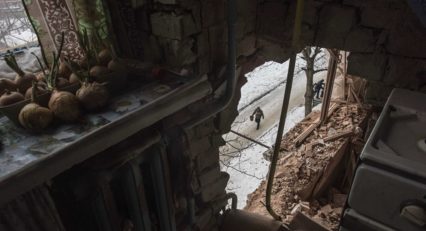
|
On Wednesday, UN Resident Coordinator and Humanitarian Coordinator in Ukraine Neal Walker warned that over one million people could loss access to clean water and heat due to increased fighting along the contact line separating the government and separatist territories in eastern Ukraine. Filter stations around the Donetsk region are more regularly being shelled. Walker asserts that, “as we enter winter, any disruption of essential services, such as water and heating amid freezing temperatures could have grave consequences.” Additionally, UN officials are concerned that chlorine gas stored at these filter stations could be released. They believe that if even one of the 900 kg containers is hit, anyone within 200 meters of the filter station could receive a fatal dose of the poisonous gas. Comment: Over 10,000 people have already died in the conflict that broke out in April 2014. Cease-fire agreements signed in September 2014 and February 2015 slowed the fighting, but the violence still continues. (Radio Free Europe, Sputnik International, UN News Centre)
Researched/Written by Amy Pipher
|
|
|
|
|
| |
This week in the Middle East & North Africa
|
|
|
|
| |
SAUDI ARABIA: Dozens of royals, businessmen and ministers arrested in anti-corruption probe
| |
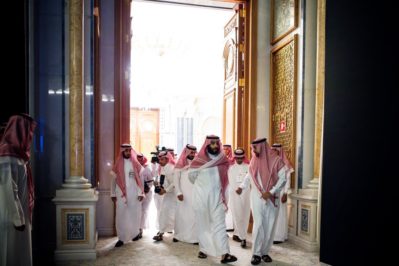
|
Late Saturday night, hours after announcing a powerful new anti-corruption committee headed by Crown Prince Mohammed bin Salman, Saudi officials arrested dozens of prominent figures. Those arrested include ministers, businessmen and 11 members of the royal family, including prominent billionaire Prince Alwaleed bin Talal. Saudi Attorney General Saud al-Mojeb said the wave of arrests was “Phase One” of the country’s new anti-corruption push. Government officials and its supporters are framing the arrests as part of the Crown Prince’s efforts to broadly reform Saudi Arabia, where rampant corruption is a top concern for most Saudis; however, most independent analysts brand the action as a power move by the Crown Prince, who has rapidly consolidated power and systematically removing potential challengers to the throne before his own succession. Comment: The anti-corruption campaign is the latest reform effort from the Crown Prince since coming to power in 2015, including efforts to ween the economy from its reliance on oil, granting women the right to drive, and a more aggressively assertive foreign policy. (Al Arabiya, Al Jazeera, New York Times, Washington Post, Reuters)
|
|
|
|
|
| |
YEMEN: New Saudi blockade of Yemen after Houthis launch ballistic missile near Riyadh
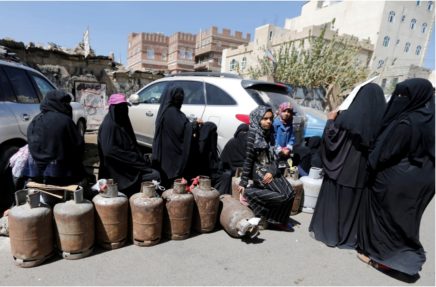
|
|
On Wednesday, 17 humanitarian agencies headed by Oxfam wrote an open letter condemning the Saudi-led coalition’s decision to close all ground, air, and sea ports into Yemen, effectively sealing the country off. The blockade, which took effect on Monday, comes after the Iranian-backed Houthi rebels in Yemen fired a ballistic missile aimed at the Saudi capital of Riyadh over the weekend. Saudi Arabia said the blockade was necessary to prevent the Houthis from smuggling weapons, but assured humanitarian aid and personnel would continue to travel freely. Saudi officials did not indicate how long the blockade will stay in place and almost all humanitarian deliveries to Yemen have been halted, including at last three United Nations airplanes full of emergency supplies. Mark Lowcock, the top relief official of the United Nations, warned that blocking any aid to Yemen’s in its already dire situation could lead it to suffer “the largest famine the world has seen for many decades, with millions of victims.” Comment: A Saudi-led coalition has been at war with the Houthis, a Shiite group supported by Iran, since March 2015. The country has since suffered one of the worst humanitarian crises currently in the world, with more than one million cases of cholera and 17 million struggling with an acute hunger crisis, more than a third of whom considered close to famine. (Oxfam America, New York Times 1, 2, AP)
|
|
|
|
|
| |
REGIONAL: Prime Minister Hariri announces surprise resignation in Saudi Arabia, stoking regional turmoil
In a prerecorded televised speech from the Saudi capital of Riyadh on Saturday, Lebanese Prime Minister Saad Hariri announced his resignation, condemning Iran and Hezbollah’s outsized influence in Lebanon and expressing fear of an Iranian assassination plot on his life. The news stunned Beirut’s political establishment, bringing down it’s nascent coalition government and sparking a new political crisis. Hezbollah leader Hassan Nasrallah issued a statement on Sunday describing Hariri’s resignation as a “Saudi-imposed decision” and it was not their wish for Hariri to resign. Iran called Hariri’s accusations unfounded and warned his resignation would cause regional turmoil. Most Lebanese see the resignation as engineered by the Saudis, as Lebanese intelligence has yet to uncover an assassination plot. Comment: Hariri held the post for less than a year. The pressure is now on Lebanese President Michel Auon, who will hold consultation with Parliament about appointing a caretaker government. Auon stated he will wait to accept or reject Hariri’s resignation until he returns to Lebanon to further explain. (Al Jazeera 1, 2, BBC, Haaretz, New York Times, AP, Reuters 1, 2)
Researched/Written by Zachary Libow
|
|
|
|
|
| |
AFGHANISTAN: Terror attack on TV station kills one and injures more than 20
On Tuesday, armed gunmen dressed as police officers stormed the Shamshad TV station, one of Afghanistan’s prominent Pashto-language news agencies, in Kabul, causing the death of one security guard and wounding more than twenty staff members. One attacker blew himself up at the entrance to the private TV station, while others barricaded themselves inside, throwing grenades and shooting at staff and security forces. The four-hour siege ended with Afghan forces killing the militants. The attack interrupted the broadcasting, but moments after the siege ended, an injured television reporter returned to the air to continue broadcasting the news. The self-proclaimed Islamic State claimed responsibility for the attack. Comment: Tuesday’s attack is the most recent in an increasing trend of violence against journalists and the media. According to the Afghan Journalists Safety Committee (AJSC), 2016 was the deadliest year for journalists and media workers in Afghanistan. (Kuwait Times, NPR, Al Jazeera 1, 2, BBC)
|
|
|
|
| |
BANGLADESH/INDIA: Anti-terror military drills begin
On Monday, the seventh annual joint military exercise between Bangladesh and India, “Exercise Sampriti,” began in the northeastern Indian states of Meghalaya and Mizoram. The drills, aimed at strengthening counter-terrorism efforts by the two countries, will continue until at least November 11. According to an Indian Defense Public Relations Officer, the exercises “will send a strong signal to the world that both India and Bangladesh understand the emerging threat of transnational terrorism and stand shoulder to shoulder united in countering this menace.” Comment: The exercises include operations in semi-mountainous terrain and dense jungles, neutralization of improvised explosive devices (IEDs), and tactical drills. Bangladeshi and Indian military personnel have been discussing this type of cooperation between forces since 2009. (Dhaka Tribune, Economic Times, Indian Express, India Today, BRICS Post)
|
|
|
|
|
| |
INDIA/PAKISTAN: Deadly smog blankets both countries, threatening public safety and causing multiple deaths
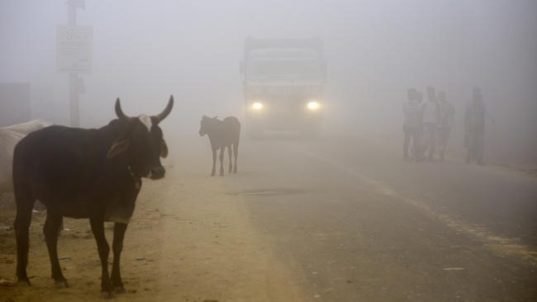
|
|
This week, thick toxic smog has blanketed much of northern India and Pakistan, causing respiratory problems and trouble breathing, reducing visibility, and causing traffic accidents that have left more than 18 dead and at least a dozen more wounded. The smog, a yearly occurrence in both countries, is caused by a combination of crop burning, construction dust, and smoke from factories and brick kilns in both India and Pakistan. The Indian Medical Association has declared this a public health emergency, and both countries are urging people to remain indoors as meteorologists believe the smog could remain at this level for another two weeks. Comment: Pollution levels in New Delhi have hit 30 times the level considered safe by the World Health Organization (WHO), and the average air pollution in Pakistan’s major cities is about 4 times higher than the WHO limits. Many residents of both countries took to Twitter to complain of the lack of government solutions to this recurring problems of pollution. (Pakistan Today, Gulf News, The Weather Channel, LA Times, BBC)
Researched/Written by Natalie A. Landau
|
|
|
|

|
|